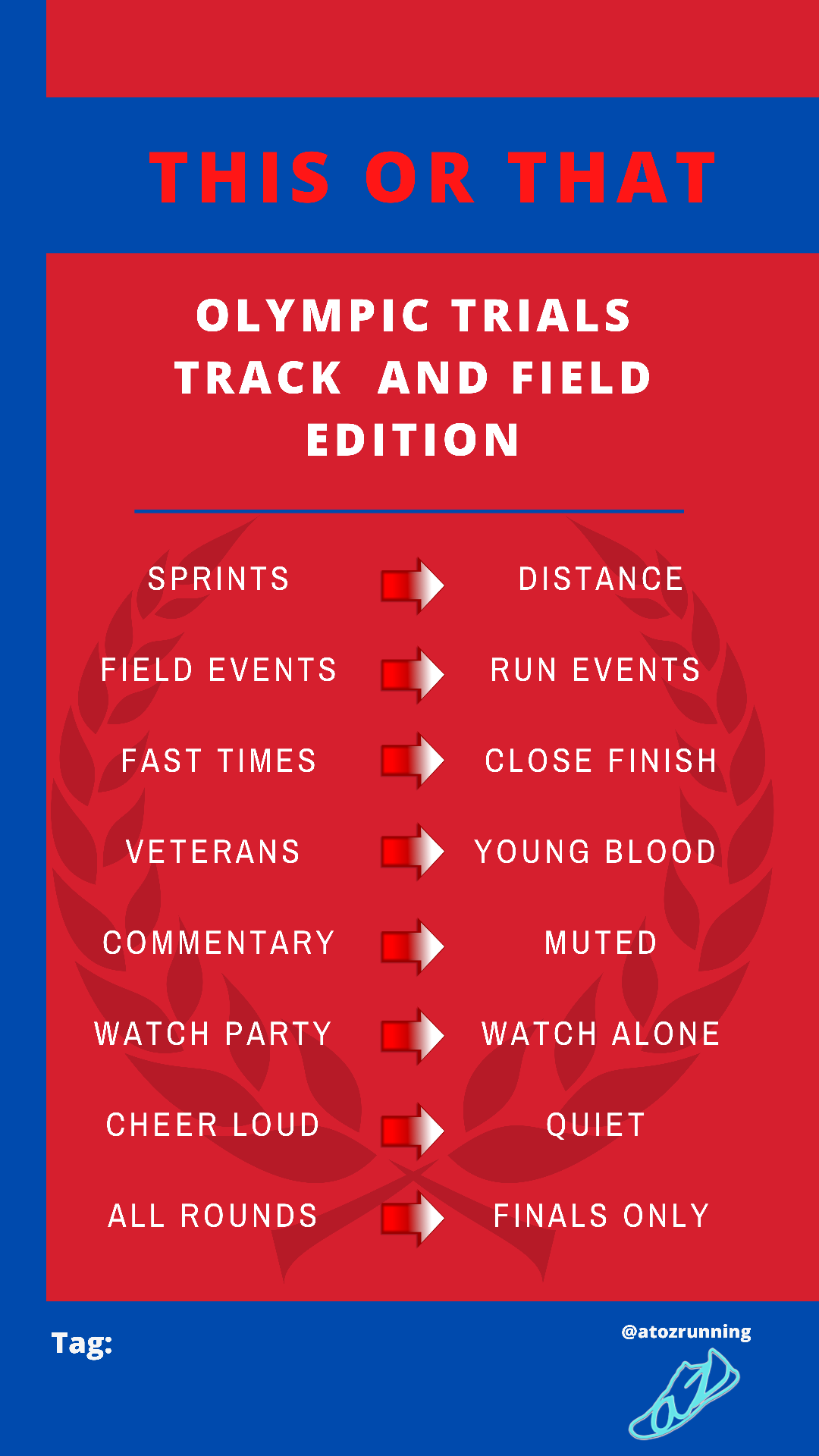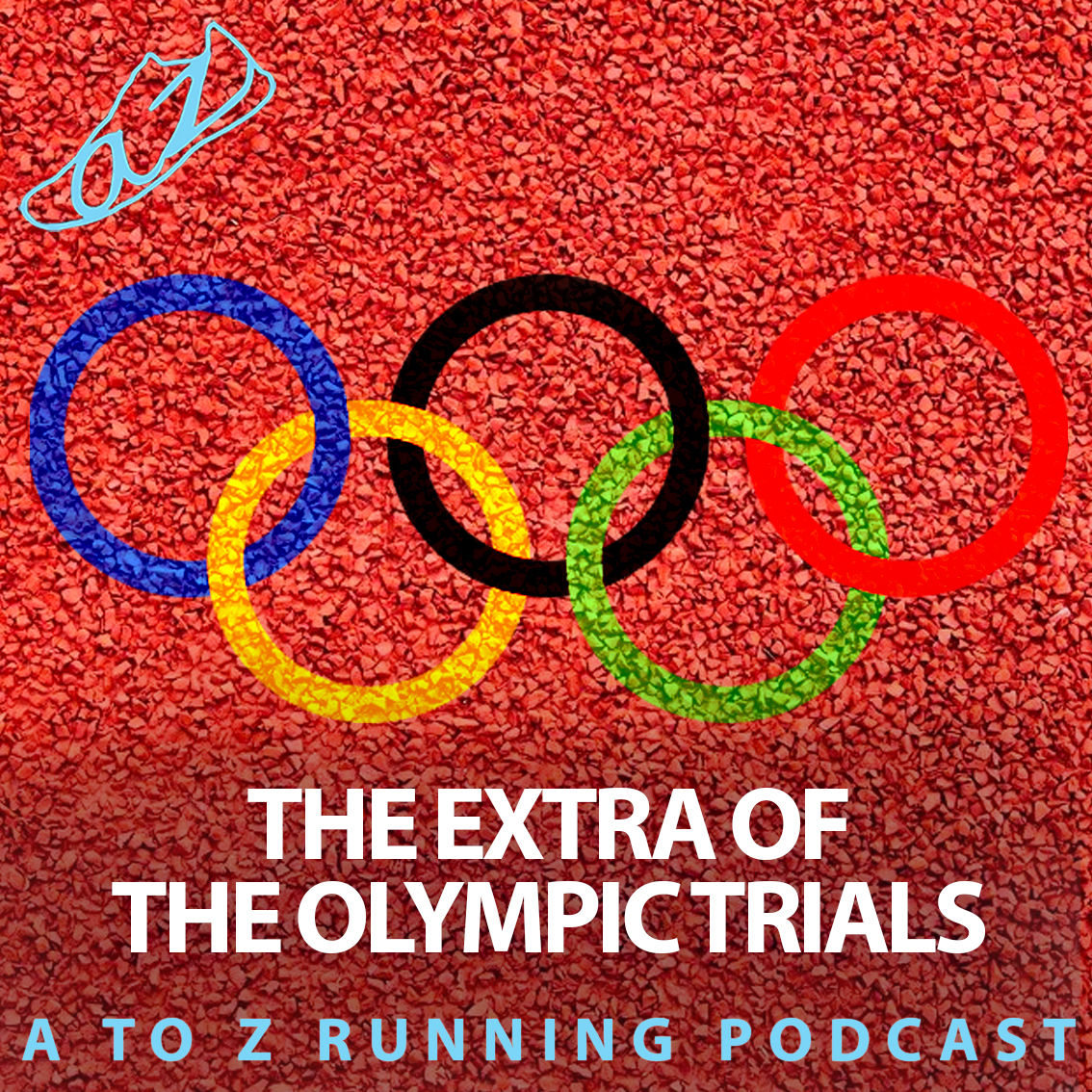LISTEN
The U.S. Olympic Track and Field Trials determined the Olympic Team who will make up Team USA. In this episode of the A to Z Running Podcast, Andi and Zach discuss “extra” info and nuances involved in the Olympic Trials results.
INTRO
-
-
- FOLLOW and SUBSCRIBE
- Thanks to listeners who played “This or That” on instagram @atozrunning. If you would like to play, feel free to save the template.

-
- Episode sponsor: Roll Recovery
- Check it all out at rollrecovery.com where you can build your own R8 deep tissue massage tool.
- Tune into the episode to hear from Louis Falland of Roll Recovery tell us about many professional runners (many of whom competed at the trials) who use Roll Recovery products.
- Episode sponsor: Roll Recovery
-
World of Running
Let’s kick it off with a few quick takes and interesting moments from the Trials:
- Thanks to AtoZrunner Pete for his post-marathon reflection.
- Teenagers have a hard time resisting 6-figure shoe company contracts… even if it means taking a pass on being able to compete in college
- Kessler (high school)
- Knighton (high school)
- Mu (at least got to break a bunch of NCAA records in her first year)
Elsewhere… Sisters make great motivators?
- Alicja and Aneta Konieczek fulfill goal/dream to compete at the Olympic games together.
- Check out our interview with Alicja about goals setting.
- Another sister duo and previous guest Cindy Ofili and her sister Tiffany Porter are going to the Olympics representing Great Britain in the 100mh.
- Check out our interview with Cindy Ofili.
U.S. Olympic Team Trials
Historical Fact: A little history, in 1972 the US moved from having qualifying meets to qualifying standards.
800m
Historical Fact: 1928 women were reportedly running to exhaustion and were further banned from running anything over a 200m with concerns for women’s reproductive health and premature aging. 800m returned for Rome 1960.
Women’s 800m
- Stacked field. 5 women ran under 1:59.
- The 19 year old, Athing Mu, looked completely in control in her preliminary heats (world lead and #2 time in US: 1:56.07)
- Raevyn Rogers was the 2019 world championships silver medalist and made her first Olympic team.
- American Record Holder, Ajee’ Wilson, was boxed in coming through the final stretch, got around, and claimed her third place position, making her 2nd Olympic team.
- If you want to hear more from Ajee’ Wilson we spoke to her about facing the noise at championship events (which she did so well here) in ep 74 of the A to Z Running Podcast.
Men’s 800m
-
- Shared this last week, so go listen, but the quick reminder:
- Clayton Murphy (in a world leading time of 1:43.17)
- Isaiah Jewett (who recently won NCAAs as well)
- Bryce Hoppel
1500m
Historical fact: The first winner of the 1500m ever was in1896 was Edwin Flack of Australia. He was the first Australian Olympian and the only to represent at those games. Women began competing in the event in 1972.
Women’s 1500m
-
- Shared this last week, so go listen, but the quick reminder:
- Elle Purrier St. Pierre (in a trials record 3:58.03)
- Cory McGee
- Heather MacLean
Men’s 1500m
- Olympic Trials Champion, Cole Hocker
- Hocker does NOT have the qualification standard (BUT he is ranked high enough in the world)
- Lots of argument about this
- USATF rules are not terribly clear
- Youngest 1500m US champ since 1974 and youngest 1500m US Olympian since 1968
- Centro won his first 1500m title at age 21
- Hocker does NOT have the qualification standard (BUT he is ranked high enough in the world)
- Matthew Centrowitz 2016 Olympic Champion smiles as he gets passed by Hocker at the line.
- Yared Nuguse (NCAA record holder) claimed the third place spot.
- Craig Engels was 4th and ranked higher than Hocker plus has the standard, so IF Hocker doesn’t go, Engels is in
3,000m Steeplechase
Historical Fact: The current format has been contested by men – initially over varying distances – in every Olympic Games since 1900, according to World Athletics. The women’s event was introduced in 2008.
The event contains 28 regular barriers and 7 water jump pits for a total of 35 jumps.
Women’s 3000m Steeplechase
- Within 800m to go there was separation with three women in front, Emma Coburn, Courtney Frerichs, and Leah Falland.
- Leah Falland fell while landing after hurdling a barrier.
- Emma Coburn ran away with the win in an Olympic Trials record of 9:09.41.
- American Record holder, Courtney Frerichs, a couple seconds behind her
- and Val Constien seized the third spot on the Olympic Team running personal best.
- Constein competes for the Tracksmith Amateur Support Program
Men’s 3000m Steeplechase
- Champion Hillary Bor was content to sit in the second place position for most of the race as leaders changed.
- It came down to the final kick with Hillary Bor holding off Benard Keter running 8:21 and change. Both men closed in under 60 secs.
- Mason Ferlic passed three men in the last lap to earn his third place position.
5,000m
Historical Fact: The event is almost the same length as the dolichos racen (greek for long race) held at the Ancient Olympic Games, introduced in 720 BCE. It was 12.5 laps, about 3 miles.
Women’s 5,000m
- Shared this last week, so go listen, but the quick reminder:
- Elise Cranny
- Karissa Schweizer (BTC teammates with Elise)
- Rachel Schneider
- Abbey Cooper gets forth.
- Abbey ran the olympic standard in her 5k prelim.
Men’s 5,000m
- Slow race tactics (it was close to 90 degrees…)
- Paul Chelimo, 2016 Olympic silver medalist, claims his win and is the victor in a crazy kick finish.
- Grant Fisher, already qualified in the 10000 13:27.01
- Woody Kincaid, already qualified in the 10000 13:27.13
- If you want to hear from Paul Chelimo on Patience and Consistency, check out ep 52.
10,000m
Historical Fact: Six men have won the Olympic title twice: Paavo Nurmi became the first in 1928 and he was followed by Emil Zátopek, Lasse Virén, Haile Gebrselassie, Kenenisa Bekele and Mo Farah. Two women have achieved the feat: Derartu Tulu won her second title in 2004 and Tirunesh Dibaba had back-to-back wins in 2008 and 2012. Derartu Tulu is the only athlete to have reached the podium on three occasions.
Women’s 10,000m
- We’ve talked about the front runner tactic, and it’s a less common choice for a distance event such as the 10000. Emily Sisson decided to take this approach to her 85 and humid race on Saturday. Although there may have been some worry and scepticism at first, she then proved her reasoning when she started separating from the entire field with two laps to go putting 10 seconds on Schweizer and Monson.
- Sisson won in a new trials record time of 31:03 (beating Deena Kastor’s record)
- Karissa Schweizer and Alicia Monson had separated from the field in 2nd and 3rd.
- Alicia Monson had to be hospitalized proving her amazing willpower and strength despite her body shutting down.
- If you want to hear from new Olympian Alicia Monson you can find her episode on A to Z Running Podcast ep 69 or linked on AtoZrunning.com
Men’s 10,000m
- Shared this last week, so go listen, but the quick reminder:
- Woody Kincaid
- Grant Fisher (BTC teammates with Kincaid)
- Joe Klecker (OAC)




Curious. With all the talk about Olympic qualifying…. Are there any changes to the marathon line up in light of the fact that the trial was so long ago?
And great job Pete!!!!
In USA, no. USATF promised those marathoners that they would keep their spot on the team, and they kept that promise (even after having a baby in the interim, in one case!).
USA is just about the only country that runs a straight top-3 ticket for the Olympics, so most nations already hold 1 or 2 discretionary spots to be decided later. In the case of the US, they simply have in writing that USATF will nominate to the Olympic team those individuals who finish top 3 and have the Olympic standard.